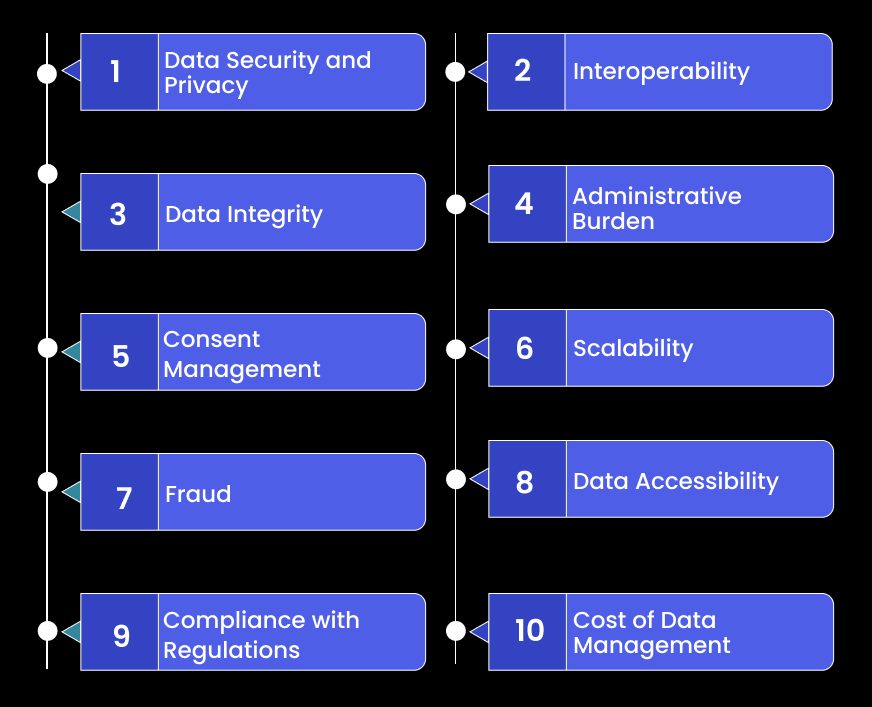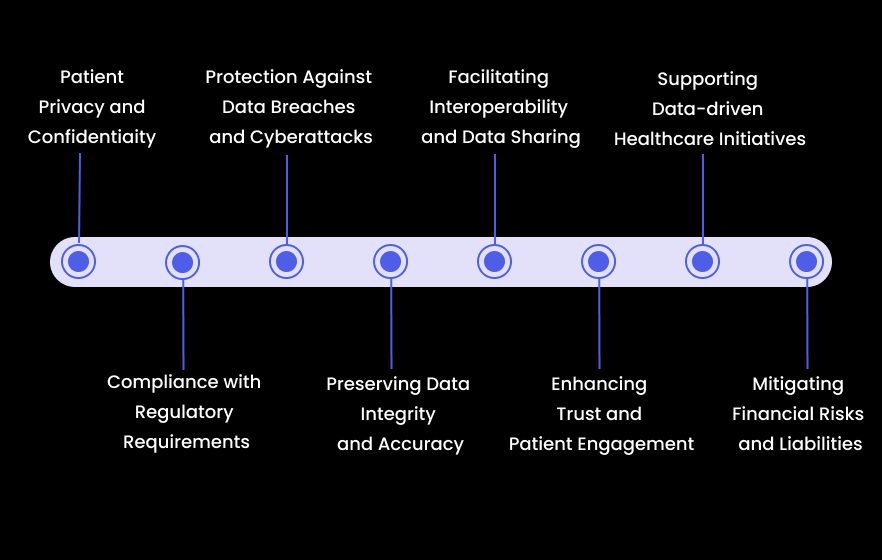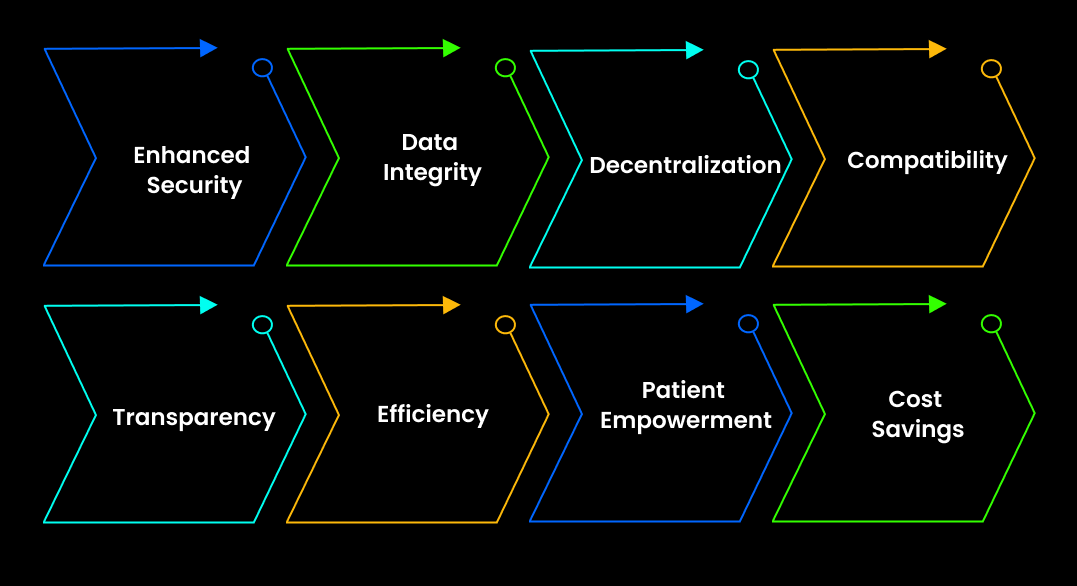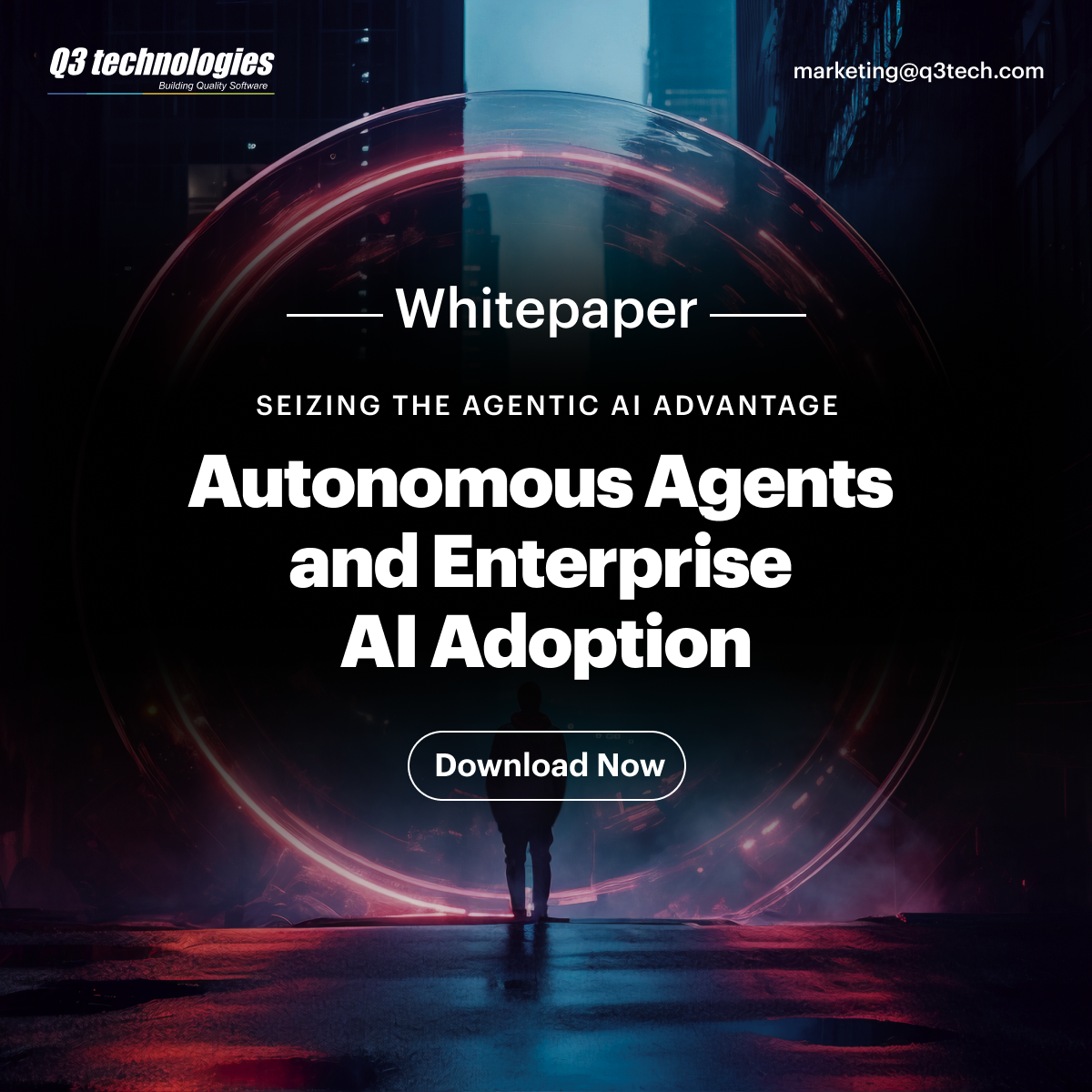Blockchain
How to Securely Store and Share Healthcare Data with Blockchain Technology
 Updated 17 Jun 2024
Updated 17 Jun 2024

Like its name, Blockchain stores data in the form of blocks that are connected or linked together, forming a chain. This Blockchain keeps growing as the transactions increase. The blocks record the sequence and time of the transactions that are logged into the Blockchain. All this takes place in a highly secured network that is administered by instructions decided by the participants of that particular network. The information in Blockchain is extremely transparent and is available for all participants to view. Confidential data is encrypted with the help of cryptographic algorithms making them one of the most secure technology available on the internet.
Blockchain is used by companies across many industries to store, share, and transport data. Numerous firms are interested in Blockchain in the healthcare industry as they work to realize its full potential and reap its advantages. Digitalization has ensured that all records are updated and available online, which means they have to be protected and secured. Breaches in the healthcare industry are not uncommon, and this is why it is significant that they are moving to Blockchain. In the past year, the healthcare industry has faced 809 breaches, and since 2020, the cost of data breaches has gone up to $10.93 million or 53.3% in 2023.
Blockchain is a distributed ledger system that keeps track of transactions in a database made up of linked blocks that are joined together by hash values, creating the appearance of a chain. Because changing any data within a block once it has been uploaded requires agreement from the majority of network nodes, it is extremely secure. Since Blockchain is a decentralized network and each member has an identical copy of the data, it guarantees that no one entity has control. Through information cross-referencing and validation between nodes, this network system enables the network to self-correct and remove faults. Moreover, Blockchain is a great option for healthcare systems because of its distributed nature, which allows independent computers to continuously record, share, and synchronize transactions in their electronic ledgers.
Let us explore the advantages and use cases of Blockchain in the healthcare system.
Real-World Success Story
Blockchain Breakthrough: Q3 Technology’s Pioneering Solution for Enhanced Healthcare Efficiency for a Premier Healthcare Provider in India
Technology Stack
- Ethereum Blockchain
- React Native
- Atom Editor
Challenge
The customer was looking for a creative way to increase the efficiency of data exchange between medical professionals in order to improve treatment outcomes, increase diagnostic precision, and lower the overall cost of healthcare systems.
Solution
Q3 Technologies is a leading blockchain development company that has developed an advanced application using the Ethereum platform and integrated smart contracts to revolutionize healthcare data management and improve user experience.
Key features of the solution include:
Smart Contracts provide secure data exchange by removing the need for third-party involvement, ensuring that data transactions are transparent and tamper-proof.
Ethereum Blockchain: This platform backs up patient data and guarantees high-level data security and integrity. It ensures that patient information is indestructible due to decentralization and cryptographic protection.
Error-Free Information: The application ensures error-free data management and history and protects users from accessing incorrect prescriptions and procedures. This significantly minimizes the risk of medical errors.
Data Privacy: Patient data remains private and is only accessible to authorized practitioners upon patient consent and maintains strict confidentiality and control over personal health information.
Outcome
Enhanced Data Management: The application provides robust and efficient data management and improves overall healthcare service delivery.
Indestructible Data: Utilizing blockchain technology ensures that patient data is indestructible and immutable, which enhances reliability and trust.
Cost-Efficiency: The elimination of intermediaries and streamlined processes results in significant cost savings for healthcare providers.
Time Saving: The automation and efficient management of healthcare data save time for both healthcare providers and patients which leads to a more effective healthcare system.
This blockchain-based solution not only addresses the client’s challenges but also sets a new standard for secure and efficient healthcare data management and ultimately contributes to better healthcare outcomes.
Read Our Case Study: Revolutionizing Healthcare With Q3’S Blockchain Application For A Leading Healthcare Provider In India
Challenges in Healthcare Data Management
Managing healthcare data involves numerous challenges that affect the efficiency, safety, and overall quality of healthcare services. Here are some of the significant challenges:

1. Data Security and Privacy
Healthcare data is highly sensitive and contains personal information, medical histories, and financial details of patients and service providers. Ensuring the security and privacy of this data is significant, yet the healthcare sector is a frequent target for cyberattacks. Data breaches can lead to identity theft, financial loss, and compromised patient care.
2. Interoperability
Healthcare systems and providers often use different Electronic Health Record (EHR) systems, which can results in difficulties in sharing and accessing patient data. Lack of interoperability between systems results in fragmented patient records, which can hinder effective care coordination and decision-making.
3. Data Integrity
Maintaining the accuracy and consistency of healthcare data is critical. Errors or alterations in data can lead to misdiagnoses, incorrect treatments, and potentially harmful outcomes. Thus, it is important to address data integrity across various platforms and during data exchanges, which is a significant challenge.
4. Administrative Burden
Healthcare providers spend a considerable amount of time on administrative tasks related to data entry, record-keeping and compliance with regulations. This administrative burden can reduce from patient care and contribute to healthcare inefficiencies.
5. Consent Management
Patients often need to provide consent for their data to be shared among different healthcare providers and for various purposes. Managing and tracking these consents across multiple systems and ensuring compliance with legal requirements can be complex and resource-intensive.
6. Scalability
As the volume of healthcare data enhances exponentially, managing and storing this data efficiently becomes increasingly challenging. Traditional data management systems may struggle to scale effectively, which leads to performance issues and increased costs.
7. Fraud
The healthcare sector is vulnerable to fraud, including false claims, counterfeit drugs, and unauthorized access to services. Detecting and preventing such activities requires robust systems capable of tracking and verifying data accurately.
8. Data Accessibility
Ensuring that healthcare providers and patients can have access to relevant data when needed is crucial for timely and effective care. However, access controls must balance ease of access with security measures to protect sensitive information.
9. Compliance with Regulations
Healthcare data management must comply with various regulations. These laws and rules may be different for each country. Navigating these complex regulatory landscapes and ensuring ongoing compliance can be challenging.
10. Cost of Data Management
Implementing and maintaining secure, interoperable, and compliant data management systems can be expensive. Healthcare organizations must balance the need for advanced technology solutions with budget constraints.
Addressing these challenges requires innovative solutions, and blockchain technology offers promising capabilities to transform healthcare data management.
The Need for Secure Healthcare Data Management
In today’s digital age, the healthcare industry faces several challenges in effectively managing and safeguarding sensitive patient data. As technological advancements continue to revolutionize healthcare delivery, the need for secure healthcare data management has become more critical than ever. Here are several key reasons why secure healthcare data management is essential:

Patient Privacy and Confidentiality
Protecting patient privacy and confidentiality is a fundamental ethical and legal obligation for healthcare organizations. Patient data, including medical records, treatment histories, and personal information, must be safeguarded from unauthorized access or disclosure. Failure to uphold patient privacy can erode trust in healthcare providers and compromise patient well-being.
Compliance with Regulatory Requirements
Healthcare data management must adhere to stringent regulatory standards and requirements. Non-compliance with these regulations can result in severe penalties, including hefty fines and legal repercussions. Secure data management practices are essential to ensuring compliance with regulatory frameworks and maintaining the trust of regulatory authorities.
Protection Against Data Breaches and Cyberattacks
The healthcare industry is a prime target for cyberattacks due to the valuable nature of patient data and the proliferation of digital healthcare systems. Data breaches and cyberattacks can result in the theft, alteration, or destruction of sensitive patient information, which may cause financial losses, reputational damage, and disruptions to patient care. Robust security measures are essential to safeguarding healthcare data from malicious actors and mitigating the risk of cyber threats.
Preserving Data Integrity and Accuracy
Maintaining the integrity and precision of healthcare data is vital to ensure the delivery of safe and effective patient care. Data integrity refers to the consistency, accuracy, and reliability of data throughout its lifecycle. Unauthorized alterations or tampering with healthcare data can compromise patient safety, lead to medical errors, and undermine trust in healthcare providers. Secure data management practices, such as encryption and access controls, help preserve data integrity and minimize the risk of data manipulation.
Facilitating Interoperability and Data Sharing
Interoperability enables seamless exchange and sharing of healthcare data across different systems, providers, and organizations. Secure healthcare data management plays a vital role in facilitating interoperability by ensuring that data is accessible, standardized and protected during transmission. Effective data sharing enhances care coordination, improves clinical decision-making and enhances patient outcomes.
Enhancing Trust and Patient Engagement
Trust is a foundation of the patient-provider relationship, and secure healthcare data management is essential for building and maintaining trust with patients. When patients have confidence that their data is being handled securely and confidentially, they are probably to engage actively in their care and share accurate information with their healthcare providers. Secure data management practices contribute to a positive patient experience and foster greater patient engagement in healthcare decision-making.
Supporting Data-driven Healthcare Initiatives
Data-driven healthcare initiatives, such as population health management, predictive analytics, and precision medicine, rely on access to comprehensive, high-quality data. Secure healthcare data management is essential for ensuring the integrity, confidentiality, and availability of data for these initiatives. By leveraging secure data management practices, healthcare organizations can bind the power of data analytics to drive innovation, improve outcomes and optimize resource allocation.
Mitigating Financial Risks and Liabilities
Data breaches and security incidents can have significant financial implications for healthcare organizations, including costs associated with breach remediation, legal fees, regulatory fines, and potential lawsuits. Secure healthcare data management helps mitigate financial risks and liabilities by minimizing the likelihood of data breaches and ensuring compliance with regulatory requirements. Investing in rigid security measures and data protection strategies can ultimately save healthcare organizations from costly repercussions associated with data security incidents.
This is why integrating Blockchain in healthcare is essential.
Benefits of Blockchain in Healthcare Data Management
As the healthcare industry continues to grow, the importance of secure data management and sharing becomes increasingly apparent. Blockchain technology emerges as a promising solution and offers enhanced security, transparency, and compatibility for managing healthcare data effectively.

Enhanced Security
One of the most significant advantages of Blockchain in healthcare data management is that it employs advanced cryptographic techniques such as hashing and encryption to ensure robust security measures. Each transaction is securely recorded and linked to the previous one, generating a chain of blocks that is resistant to damage or unauthorized access. This high level of security safeguards sensitive healthcare data from cyber threats and ensures confidentiality and privacy.
Data Integrity
The immutable nature of Blockchain confirms that once data is recorded, it cannot be changed or deleted without consent from the network participants. This feature guarantees the integrity and reliability of healthcare records and provides a clean audit trail of all transactions. With Blockchain, healthcare organizations can trust the accuracy and authenticity of their data and reduces the risk of errors or discrepancies.
Decentralization
Blockchain operates on a decentralized network of nodes, where every participant maintains a copy of the entire blockchain ledger. This decentralized architecture eliminates the need for a central authority or intermediary to manage healthcare data and reduces the risk of data manipulation or censorship. Decentralization also enhances data accessibility and availability and ensures that healthcare records are always accessible, even in the event of network failures or cyber-attacks.
Compatibility
Blockchain promotes compatibility by enabling seamless data exchange and sharing across different healthcare systems, providers and organizations. By standardizing data formats and protocols, Blockchain facilitates better collaboration and coordination in patient care. Interoperability allows healthcare stakeholders to securely access and share relevant patient information which leads to improved care coordination, diagnosis and treatment outcomes.
Transparency
Another benefit of Blockchain in healthcare data management is that it creates a transparent and auditable record of all transactions, providing stakeholders with visibility into the entire lifecycle of healthcare data. Each transaction is time-stamped, cryptographically signed, and stored on the Blockchain, ensuring transparency and accountability. This transparency builds trust among stakeholders and promotes ethical behaviour in managing healthcare data.
Efficiency
Blockchain streamlines administrative processes by automating tasks such as data verification, authentication and reconciliation. Smart contracts, self-executing agreements coded on the Blockchain, automate routine processes and enforce predefined rules and conditions. This automation improves efficiency, reduces manual errors and minimizes the time and resources required for managing healthcare data.
Patient Empowerment
Blockchain empowers patients by offering them greater control over their healthcare data. Through decentralized patient portals or personal health wallets, patients can securely access, manage and share their medical records with healthcare providers or researchers. This empowerment allow patients to actively participate in their healthcare decision-making process which leads to more personalized and patient care.
Cost Savings
By eliminating intermediaries and reducing administrative overheads, Blockchain helps healthcare organizations save costs associated with data management, processing and storage. With Blockchain, healthcare providers can streamline operations, reduce paperwork, and minimize the need for manual intervention, which results in significant cost savings with time. Additionally, Blockchain’s decentralized construction reduces dependency on costly infrastructure and centralized systems and further lowers operational expenses.
Applications of Blockchain in Healthcare System
With its innovative applications, Blockchain offers transformative solutions to revolutionize how healthcare information is stored, shared, and utilized, which shaped the future of healthcare data management. Here are some use cases of Blockchain in healthcare:
Patient Data Management
Blockchain applications in patient data management revolutionize how healthcare institutions store, access, and share patient information securely. By leveraging Blockchain’s decentralized ledger, patient records can be stored in a tamper-proof and encrypted format, ensuring privacy and confidentiality. This empowers healthcare providers to access accurate and up-to-date patient data seamlessly, regardless of the patient’s location or healthcare provider. Moreover, patients have greater control over their data, granting permission to specific healthcare providers for accessing their medical history while maintaining data integrity and security.
Clinical Trial Management
Blockchain technology offers significant advancements in managing clinical trials by ensuring the integrity and transparency of trial data. Through blockchain-enabled platforms, researchers can securely record and track each step of the clinical trial process starting from patient recruitment, data collection, and outcome analysis. The immutable nature of Blockchain ensures that trial data remains tamper-proof and authentic, preventing data manipulation or fraud. Additionally, Blockchain facilitates secure data sharing among researchers and regulatory bodies, streamlines the trial management process, and expedites the development of new treatments and therapies.
Pharmaceutical Supply Chain Tracking
Blockchain applications provide unprecedented transparency in the pharmaceutical supply chain, addressing the pervasive issue of counterfeit drugs. By recording each stage of the supply chain on a blockchain ledger, from manufacturing to distribution and delivery, stakeholders can verify the authenticity and provenance of pharmaceutical products in real time. This ensures that patients receive genuine medications, lessens the risk of counterfeit drugs coming into the market, and enhances patient safety. Moreover, blockchain-enabled supply chain tracking enhances efficiency and accountability, enabling faster response to recalls or quality issues.
Telemedicine and Remote Monitoring
Blockchain technology facilitates secure and efficient telemedicine and remote monitoring solutions and enables healthcare providers to provide virtual care services remotely. Through blockchain-enabled platforms, patients can securely share their health data, such as vital signs, medical history, and diagnostic reports, with healthcare professionals for remote consultation and monitoring. Blockchain ensures the privacy and reliability of patient data during transmission, mitigating cybersecurity risks associated with traditional telemedicine platforms. Additionally, Blockchain supports the integration of IoT devices for real-time data monitoring and enables proactive healthcare interventions and personalized treatment plans.
Interoperable Health Data Exchange
Blockchain in healthcare promotes interoperability by enabling seamless exchange and sharing of healthcare data across disparate systems and stakeholders. Unlike traditional healthcare IT infrastructure, which relies on centralized databases and proprietary data formats, Blockchain provides a decentralized and standardized approach to data exchange. Through blockchain networks, healthcare providers, insurers, and patients can securely access and share standardized health data, such as medical imaging files and Electronic Health Records (EHRs) , in a tamper-proof and compatible format. This facilitates better care coordination, improves clinical decision-making and enhances patient outcomes by ensuring that healthcare data is accessible and actionable across the continuum of care.
Credential Verification for Healthcare Professionals
Blockchain technology offers a reliable solution for verifying the credentials of healthcare professionals, ensuring the authenticity and integrity of their qualifications. Record credentials, certifications, and licenses on a blockchain ledger. Healthcare organizations can streamline the verification process, reduce administrative burdens, and minimize the risk of credential fraud. Blockchain-enabled credential verification platforms allow employers, regulatory bodies, and patients to easily authenticate healthcare professionals’ qualifications, which enhances trust and transparency in the healthcare workforce.
Healthcare Payments and Claims Processing
Blockchain applications streamline healthcare payments and claims processing, improving efficiency and reducing administrative costs for healthcare providers and insurers. Through smart contracts and blockchain-based payment systems, healthcare transactions such as insurance claims and provider reimbursements can be automated, mitigating the need for intermediaries, and accelerating payment processing. Blockchain’s transparency and immutability ensure the integrity of payment records reduces billing disputes and fraud. Moreover, blockchain-enabled payment systems enhance financial transparency and accountability and enables stakeholders to track the flow of funds and ensure compliance with regulatory requirements.
Data Monetization and Research Collaboration
Blockchain technology enables healthcare organizations to monetize and share anonymized patient data securely for research and development purposes. By leveraging blockchain-based data marketplaces and smart contracts, healthcare institutions can facilitate data exchange agreements with researchers, pharmaceutical companies and other stakeholders while preserving patient privacy and data ownership rights. Blockchain ensures that data transactions are transparent, auditable, and compliant with data protection regulations, which builds trust and collaboration in the healthcare research ecosystem. Additionally, blockchain-enabled data monetization models incentivize patients to contribute their health data to research initiatives, drive innovation, and accelerate medical breakthroughs.
Public Health Surveillance and Outbreak Response
Blockchain applications support public health surveillance and outbreak response efforts by providing real-time data sharing and analysis capabilities. Through blockchain networks, public health agencies can securely collect, store, and analyze epidemiological data, such as disease incidence rates, geographic spread, and demographic trends. Blockchain-enabled surveillance systems enable early detection of infectious disease outbreaks and allow authorities to implement timely intervention measures and mitigate the spread of contagions. Moreover, Blockchain facilitates secure data sharing and collaboration among healthcare stakeholders, researchers, and government agencies, as well as enhances coordination and response efforts during public health emergencies.
Patient Empowerment and Data Ownership
Blockchain technology empowers patients to take control of their healthcare data and exercise ownership rights over their personal health information. By storing patient records on a blockchain ledger, individuals can securely access, manage and share their health data with healthcare providers along with other authorized parties. Blockchain-based patient portals and Personal Health Record (PHR) platforms enable patients to track their medical history, treatment plans, and health outcomes in a decentralized and interoperable format. This promotes patient engagement, informed decision-making, and personalized healthcare delivery, which builds a collaborative and patient-centric approach to healthcare management.
Blockchain in healthcare presents an innovative solution to the many challenges faced by healthcare data management. Its integral security, decentralization and compatibility offer a rigid framework for ensuring the integrity, confidentiality and accessibility of patient information. By leveraging blockchain applications, healthcare systems can streamline operations, enhance data security, and facilitate seamless data exchange, ultimately leading to improved patient outcomes and a more efficient healthcare ecosystem. As Blockchain continues to advance and integrate into healthcare infrastructure, its potential to revolutionize data management processes remains unparalleled, promising a future where healthcare data is secure and transparent.



